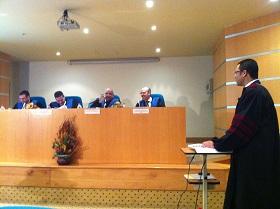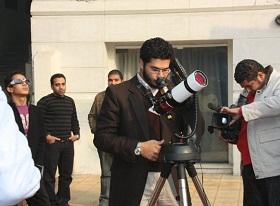Using AI to control energy for indoor agriculture
30 September 2024
Published online 15 June 2011

Egypt's interim government plans to boost public funding of science by nearly 40% next year and reorganize its research sector as it attempts to increase its international standing in science.
"Currently we are spending 0.24% of GDP on research and development," said Amr Salama, interim science minister. This compares with an average of 0.3% in most Arab countries and 2.2% in the United States and Europe.
"Our vision is to raise that to 2% within three years. This is quite an ambitious plan though given the current economic situation in Egypt, but I'm confident we can reach that target in five years," says Salama.
Salama also claims the ministry of higher education and scientific research is recruiting 50,000 science graduates to public and private universities and in industries engaged in research and development over the next three years. These positions will be offered to top graduates from all science universities in the country over the past eight years.
"The most important thing is that the interim government is committed, they want to expand the funding, but they cannot sustain that forever," said Maged Al-Sherbiny, president of Egypt's Academy of Scientific Research and Technology (ASRT) and assistant science minister , "We must find ways to interact with NGOs and industry to sustain the surge."
Al-Sherbiny estimates that the total spending on science from the public and private sectors in Egypt for the next fiscal year will reach US$502 million. The ministry of higher education and scientific research will receive US$92 million, an increase from US$65 million in the current fiscal year, to fund its research centres.
ASRT, which is the science ministry's arm charged with coordinating the country's research programme, will also see its budget rise from US$2.6 million to US$13 million.
We need to do our best to make the average person on the street see science as the way forward.
"The salaries of all researchers and those in higher education will also increase," said Al-Sherbiny. This will lead to annual salary increases ranging from US$1,200 up to US$4,200 for each person.
"We understand very well that there will never be development and progress in Egypt unless we are able to be internationally competitive in science. The current government cabinet makes me optimistic. The Prime Minister [Essam Sharaf] is a scientist and he supports scientific research wholeheartedly," adds Salama.
The ministry of higher education and scientific research will take control of all publically funded research centres. Up to now, certain centres came under the auspices of other ministries, such as the Agricultural Research Centre being run by the ministry of agriculture. Al-Sherbiny says this will streamline research and help avoid wasting money on duplicate research.
Al-Sherbiny said the government wants to fund both basic and applied research with a focus on "new frontier" research such as nanotechnology, pharmaceuticals and space exploration. The interim government will upgrade existing research centres while opening up to 10 new large centres. One target set by the ministry is to increase the quantity of research papers authored by Egyptian scientists and published in international peer-review journals to 30,000 each year, up from the 7,500 this year.
Science students must also learn how to conduct research — a skill not taught in universities, adds Al-Sherbiny. Practical work must become part of university curricula and he suggests that graduates spend three to six months on a course that prepares them for laboratory work.

Salama acknowledged that extra funding will not fix all of Egypt's science woes. He says the public's lack of interest in science and poor standard of education are hindrances to developing a culture of world-class research in the country.
"We need to do our best to make the average person on the street see science as the way forward. We need to create a science culture and we will put together a plan to reach out to the layperson, not just the scientist, and make them excited about science," said Salama.
According to Al-Sherbiny, nearly 90% of the books or magazines read by people are religious or entertainment. "We need to change this culture, and we need to do this at home." He suggests encouraging museums attendance and celebrating astronomical events such as solar and lunar eclipses.
doi:10.1038/nmiddleeast.2011.70
Stay connected: